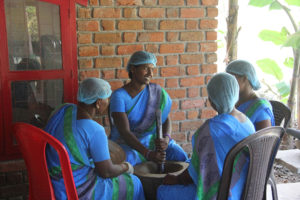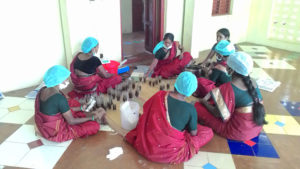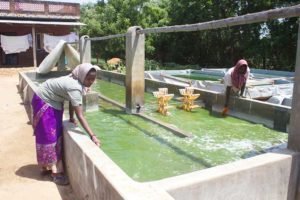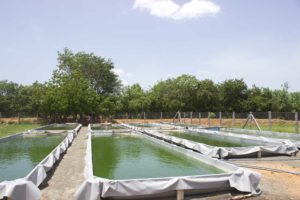Rural Women’s Enterprise
We have helped to establish three rural women’s enterprises in Nadukuppam, cooperatives of local villagers who use their knowledge of indigenous plants to support their livelihood and that of their family.
Our mission in this work is to build a viable and sustainable social enterprise model that can:
- Rehabilitate local indigenous traditions into health care practices
- Contribute to the financial and social development of women and BPL communities in the Bio-region
- Provide high-quality, affordable and natural herbal products
- Provide income-generating opportunities and capacity-building programs to beneficiaries
- Conserve medicinal plants and our traditional knowledge
If you are interested in finding out more about our work, sampling the products from Nadukuppam or supporting our work in other ways, please contact us, marking your message for the attention of Mrs. Parvathi Nagarajan (Herbal Enterprise program coordinator).
Amirtha Herbal Remedies

Emerging out of the SEDAB (Sustainable Development in the Auroville Bioregion) project, Amirtha Herbal Medicines is a unit that collects medicinal plants, processes them into products, and markets these products as natural alternatives to chemical medicines. Workshops are offered to women’s self-help groups that promote kitchen herbal gardens and teach the preparation of medicines using locally available plants. These are efforts to support and conserve the traditional knowledge and make it once more strongly embodied in a ‘people’s health culture’.
For samples, wholesale and bulk orders of Herbal foods please send a mail, marking your message for the attention of Mrs.Parvathi Nagarajan
For more information see blog: https://amirthaherbals.wordpress.com/
Meera Herbal Food
 In collaboration with SEDAB, Pitchandikulam has also established Meera Herbal Food, a unit that collects medicinal plants, processes them into products, and markets these products as food. The unit blends Siddha and traditional herbal knowledge to produce effective medicinal food products. The enterprise is working towards the empowerment and self-sufficiency of local indigenous Irula tribes.
In collaboration with SEDAB, Pitchandikulam has also established Meera Herbal Food, a unit that collects medicinal plants, processes them into products, and markets these products as food. The unit blends Siddha and traditional herbal knowledge to produce effective medicinal food products. The enterprise is working towards the empowerment and self-sufficiency of local indigenous Irula tribes.
For samples, wholesale and bulk orders of Herbal foods please send a mail, marking your message for the attention of Mrs.Parvathi Nagarajan
Nadukuppam Spirulina Unit
 Spirulina is grown in natural sunlight at Nadukuppam Village in the Kazhuveli bioregion of coastal Tamil Nadu by local women’s self help groups. This provides a source of income generation for the women and promotes a low cost, highly nutritious food supplement. The unit also provides spirulina for a successful health drink program for underweight students at the local primary and secondary schools, and also for elderly people.
Spirulina is grown in natural sunlight at Nadukuppam Village in the Kazhuveli bioregion of coastal Tamil Nadu by local women’s self help groups. This provides a source of income generation for the women and promotes a low cost, highly nutritious food supplement. The unit also provides spirulina for a successful health drink program for underweight students at the local primary and secondary schools, and also for elderly people.
Nadukuppam spirulina is produced with technical input and support from the Kazhuveli Environment Education Trust (KEET) and Pitchandikulam Forest, Auroville.
About Spirulina :
 Spirulina is a tiny blue-green algae which grows in the shape of a perfect spiral coil. Biologically speaking it is one of the oldest inhabitants of the planet. Appearing 3.6 billion years ago it provided an evolutionary bridge between bacteria and green plants. It photosynthesizes like plants and thrives naturally in the salt and alkaline lakes of the hot areas of the earth. Spirulina has renewed itself for billions of years and has nourished many cultures throughout history in Africa, the Middle East and America. The largest concentrations of spirulina today can be found at Lake Texcoco in Mexico, around Lake Chad in central Africa and along the Great Rift Valley in East Africa.
Spirulina is a tiny blue-green algae which grows in the shape of a perfect spiral coil. Biologically speaking it is one of the oldest inhabitants of the planet. Appearing 3.6 billion years ago it provided an evolutionary bridge between bacteria and green plants. It photosynthesizes like plants and thrives naturally in the salt and alkaline lakes of the hot areas of the earth. Spirulina has renewed itself for billions of years and has nourished many cultures throughout history in Africa, the Middle East and America. The largest concentrations of spirulina today can be found at Lake Texcoco in Mexico, around Lake Chad in central Africa and along the Great Rift Valley in East Africa.
Uses :
Spirulina is often called a super food because it contains many of the essential nutrients required for good healths. It is comprised of at least 60% vegetable protein, essential vitamins, phyto-nutrients such as the rare essential fatty acid, GLA, sulfolipids, glycolipids and polysaccharides. Calcium, phosphorus and magnesium are also present in quantities comparable to cows milk. In 1974, the World Health Organization described spirulina as “an interesting food for multiple reasons, rich in iron and protein, and is able to be administered to children without any risk,” considering it “a very suitable food.” The United Nations established the Intergovernmental Institution for the use of Micro-algae Spirulina Against Malnutrition in 2003.
